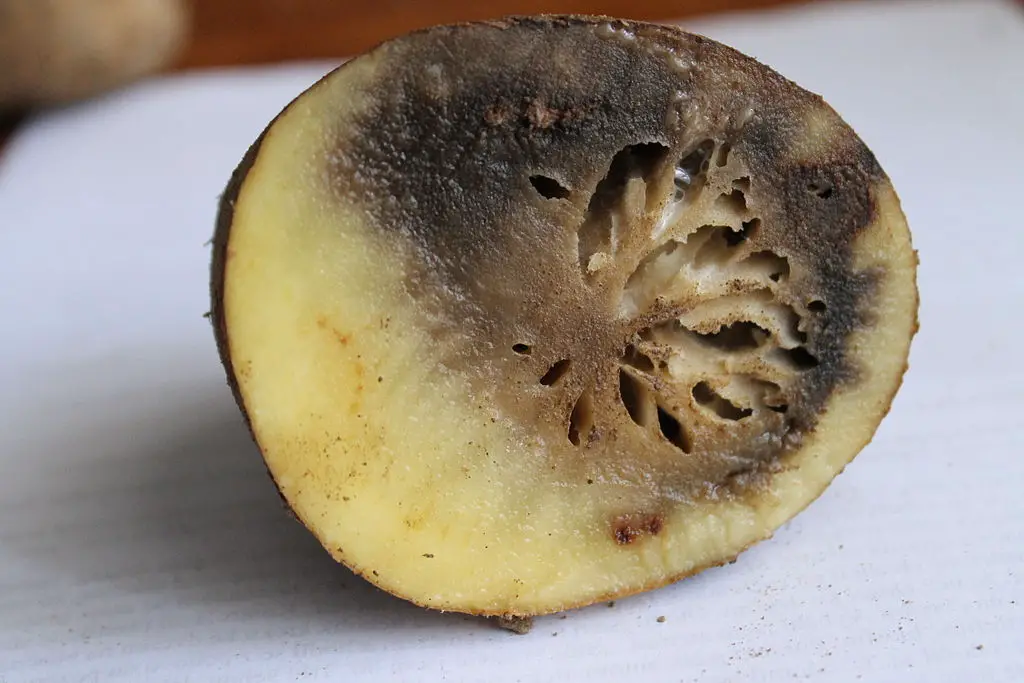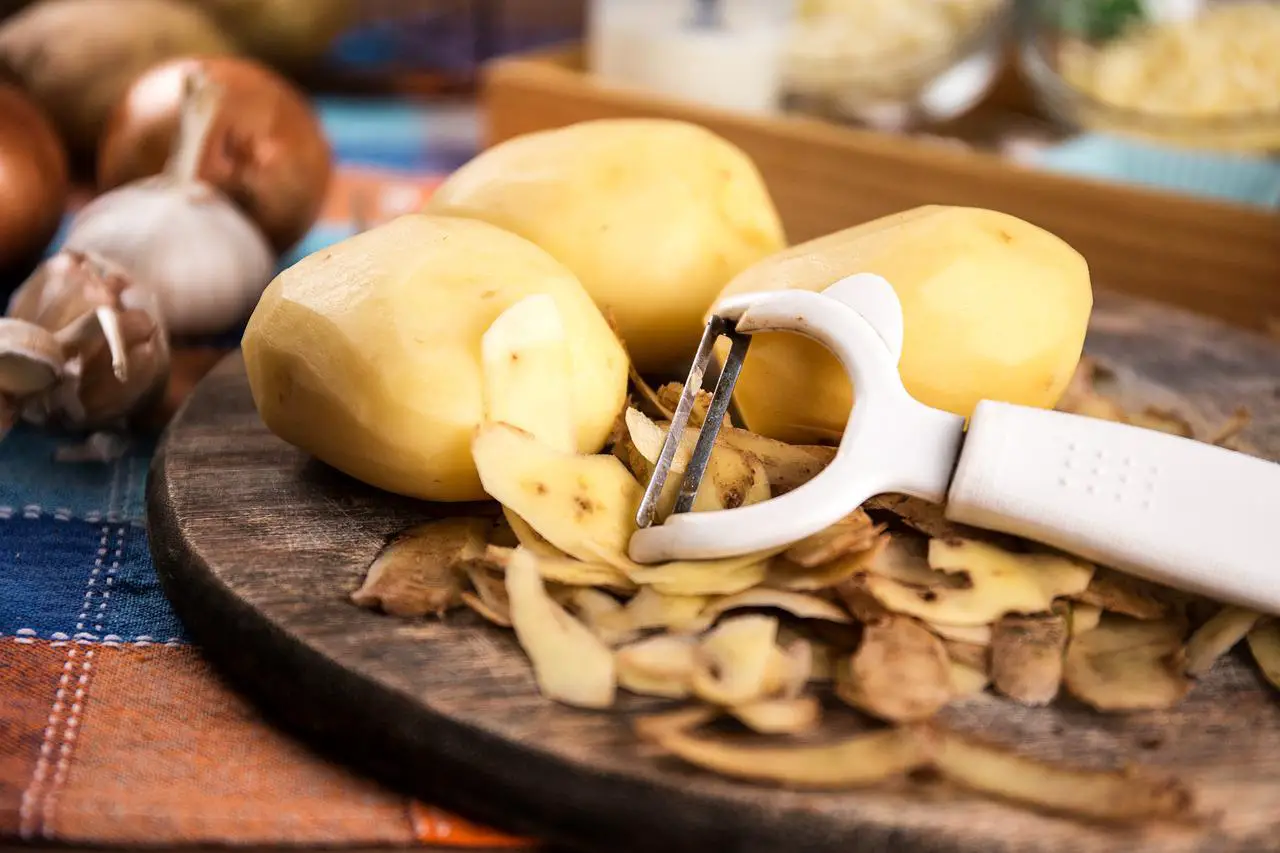You can add your potatoes to the compost pile. But they are not altogether safe. While growing, harvesting, and storing potatoes is relatively safe, they are highly prone to certain diseases, potato blight being one of them.
You can compost potatoes and potato peels. However, they can grow into fresh potatoes if they are left whole. Therefore, you need to chop up the potatoes to prevent the compost bin from becoming a breeding ground for new potato plants.
When composting potatoes, err on the side of caution. If they have blight, it’s best not to compost the potatoes. The composting cycle may not kill the spores or virus and thus might infect other plants in your vegetable garden.
Table of Contents
The Potato Blight Problem
The Solanaceae family of plants, including potatoes, tomatoes, and peppers, is susceptible to potato blight. This disease is caused by a fungus-like organism that produces spores.
The pathogen infects the stems and foliage of the plants. If a crop is exposed to potato blight for an extended period, the tubers may also be affected.
Spores multiply rapidly on wet leaves and infect leaf tissue. Spores become airborne in humid or rainy situations and land on damp leaves. As blight continues, leaves get brown lesions and the stems decay.
The spores of the potato blight grow below lesions. They appear as a white, powdery growth. Water can transport them onto other leaves and then into the soil, ending in potato tubers.
Composting potatoes purchased from the local store should be risk-free, provided you use the active composting method and that contaminated potatoes are kept out of the compost heap.

Can You Put Rotten Potatoes in Compost?
Yes. You can add rotten potatoes to the compost bin since potatoes are organic matter and break down over time.
Composting rotten potatoes is possible thanks to their high nitrogen and carbon content.
The high nitrogen content promotes the growth of plants, while the presence of carbon aids in the decomposition process.
What About Potato Peels?
Yes. You can add potato peels to your compost bin. Composting potato peelings is an excellent way to reduce kitchen scraps and improve your garden’s soil.
However, it’s essential to know that potato peelings can also be a source of the fungus which causes potato blight.
To prevent the peelings from germinating into new plants, ensure that they are buried deep enough in the compost heap and that you turn it regularly.
How Long Does It Take To Compost Potatoes?
Composting potatoes can take up to 6 months or even more, depending on the conditions.
How Long Does It Take to compost Potato Peels?
It all depends on the conditions. If the pile of peels has moisture, helpful microbes, and correct heat and oxygen levels, it will take around 3 months.
How to Compost Potatoes and Its Peels
Active composting is the way to go if you want to compost plants in the Solanaceae family, including potatoes. By actively managing your compost pile, you can ensure that it is constantly decomposing matter and creating healthy soil.
To create active compost, you need to structure your compost pile to allow decomposition to occur quickly.
That means considering all five of the factors necessary for successful composting:
1. Green and brown material balance
Compost piles that work well contain 3 parts to 4 parts browns to 1 part greens. Green material contains nitrogen, whereas brown material contains carbon. These two are necessary if you want efficient compost.
2. Small pieces size
Smaller particles provide microorganisms with more surface area to work with, which increases their chances of breaking down organic material.
Before adding the potatoes, shred or chip them, but keep the pieces large enough to enable water and air to pass through.
3. Moisture
Without adequate moisture, bacteria are unable to carry out their vital functions. To sustain a compost pile’s active decomposition, it may be necessary to water it.
Too much water, however, can lead to anaerobic conditions devoid of oxygen. That’s when rot kicks in.
4. Air circulation
Aerobic microbial activity necessitates the presence of oxygen and promotes the breakdown of organic matter.
Inserting pipes into the pile, adding wood chips, or turning your pile regularly with a pitchfork will help ensure the heap has proper air circulation.
5. Temperature
If all four parameters are met correctly, you should achieve the temperature necessary for good decomposition.
A thermometer is all you need to keep track of the temperature of your compost. Composting requires temperatures of at least 140 degrees Fahrenheit.
Bonus tips
- Remember to bury potato peels deeply. That prevents peel eye sprouting.
- Make sure that your compost pile is wet at all times. However, it would help to be on the lookout for waterlogging.
- Turn your compost pile every few weeks.
Are Potatoes and Potato Peels Good Soil Fertilizer?
Yes. You can create fertilizers out of potatoes. That is because potatoes have a high concentration of nutrients such as nitrogen and potassium, both promoting plant growth and increasing yields.
What about potato peels?
The phytonutrient and potassium in potato peels make them an excellent fertilizer for gardens.
Potato Peel Water as Fertilizer
Here’s how you prepare potato peel water:
- Boil the potatoes without peeling the skin.
- After the potato peel, water cools, and water your plants with it. The potato’s starch enriches the soil by releasing nutrients.
Remember that potato water isn’t a substitute for plant food.

